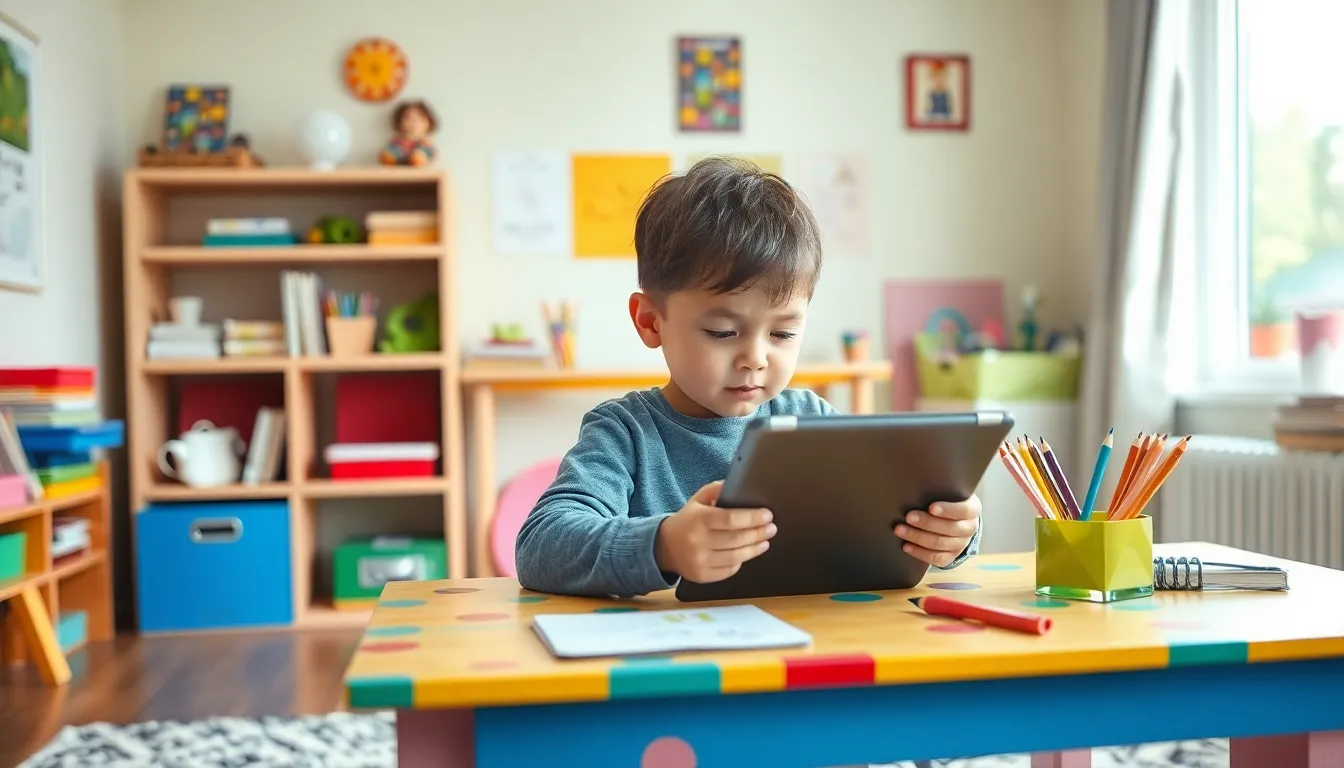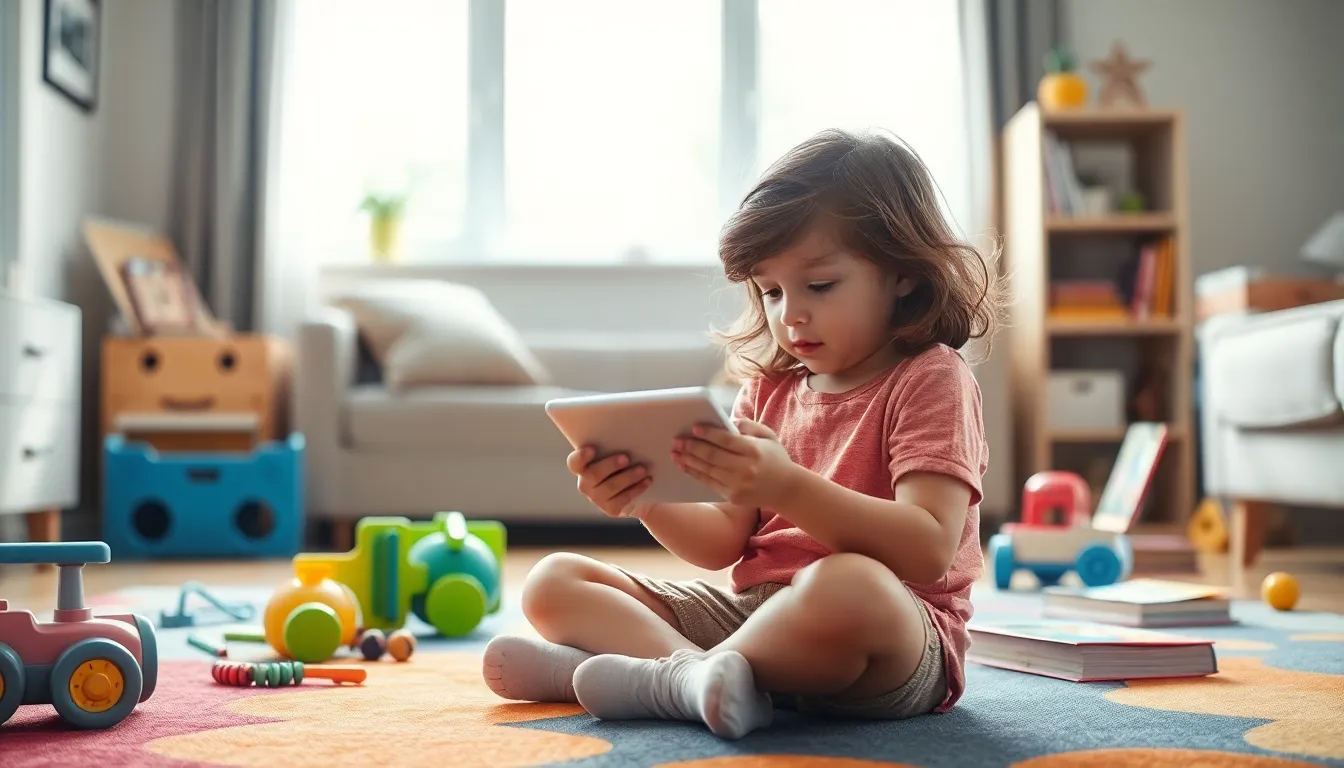In a world where kids can swipe before they can walk, screen time has become the new babysitter. From cartoons to video games, screens are everywhere, captivating young minds while parents often wonder if they’ve just signed a deal with the digital devil. But what’s really going on behind those glowing screens?
Table of Contents
ToggleOverview of Screen Time Effects on Kids
Screen time significantly affects children’s cognitive, emotional, and physical development. Studies show that excessive use leads to attention issues, decreased academic performance, and poor social skills. Children may display increased irritability when screens replace outdoor activities or interpersonal interactions. Screen time can cause disruptions in sleep patterns, making it difficult for kids to fall asleep or stay asleep.
Physical health also suffers as children who spend more time in front of screens tend to be less active. Data indicates a correlation between high screen time and obesity rates among children. Engaging with screens can lead to eyestrain, headaches, and poor posture. Conversely, moderate screen time may provide educational benefits, offering children opportunities for learning and creativity if monitored and balanced correctly.
Socially, digital interactions can enhance communication skills if used appropriately. While some children may connect with peers online, face-to-face interactions are essential for developing empathy and social awareness. Parents play a vital role in regulating screen time and fostering a healthy media environment. Setting limits according to recommended guidelines can ensure a balanced approach.
Promoting alternative activities, such as reading, games, and outdoor play, contributes to improved overall well-being. Screen time discussions should involve children, enabling them to understand the importance of moderation. By prioritizing offline engagement, parents can cultivate positive habits that support healthy development.
Positive Effects of Screen Time

Moderate screen time can yield several advantages for children. Engaging with digital content fosters learning opportunities and enhances various skills.
Educational Benefits
Educational apps and programs facilitate interactive learning experiences. Children access information quickly, enabling them to explore topics in depth. These resources can supplement traditional education, promoting engagement in subjects like math and science. Studies indicate students utilizing educational technology show improved comprehension and retention. Virtual classrooms also offer flexible learning options, accommodating diverse learning styles and needs. Significant advancements in digital literacy occur when kids interact with appropriate materials, preparing them for a technology-driven future.
Skill Development
Screen time provides avenues to develop critical thinking and problem-solving skills. Video games often require strategic thinking and decision-making, enhancing cognitive abilities. Other interactive platforms encourage creativity through content creation, such as coding or digital art. Children can learn teamwork and communication by collaborating in online environments. Social skills may improve through interactions in virtual communities. Parents find that intentional use of screen time fosters valuable skills applicable across various life domains.
Negative Effects of Screen Time
Screen time poses several potential risks to children’s overall well-being. Parents must recognize and address the various negative effects associated with excessive digital media use.
Physical Health Concerns
Physical health problems often arise from extended screen time. Lack of physical activity contributes to rising obesity rates among children. A decrease in outdoor playtime limits opportunities for exercise and social interaction. Additionally, excessive screen use can lead to vision issues, such as digital eye strain. Children may also experience poor posture, resulting in discomfort and long-term musculoskeletal problems. Screen time’s sedentary nature exacerbates these risks, making it crucial for parents to encourage active play and physical engagement.
Mental Health Implications
Mental health challenges frequently correlate with increased screen time. Children engaging with screens excessively report higher levels of anxiety and depression. Social isolation becomes a concern when virtual interactions replace in-person relationships. Poor sleep patterns also stem from late-night screen use, further affecting emotional well-being. Disconnected from reality, some children struggle to develop essential coping skills. Addressing these issues requires setting limits on screen usage and promoting healthier habits that prioritize mental wellness.
Guidelines for Healthy Screen Time
Establishing guidelines for healthy screen time is crucial for children’s development. Parents play a key role in managing and monitoring their children’s digital interactions.
Recommended Screen Time Limits
The American Academy of Pediatrics (AAP) suggests specific limits for daily screen time. For children aged 2 to 5, screen time should not exceed one hour of high-quality programming each day. Kids aged 6 and older require consistent limits on time spent in front of a screen to ensure a healthy balance with other activities. Maintaining these limits supports better physical health, mental well-being, and academic performance. Encouraging breaks every hour can also reduce risks of digital eye strain and promote physical activity.
Tips for Parents
Parents can employ several strategies to encourage balanced screen use. Establishing a daily routine helps integrate screen time with other activities, such as outdoor play or reading. Setting clear rules regarding appropriate content empowers children to make smart choices. Regular discussions about media consumption guide children in understanding the effects of screens on their lives. Being a role model by limiting personal screen use can demonstrate healthy habits. Encouraging family activities that exclude screens fosters communication and togetherness, enhancing emotional connections.
Balancing screen time is crucial for children’s overall development. While moderate use can enhance learning and critical thinking skills, excessive screen exposure poses significant risks to both physical and mental health. Parents play a vital role in regulating this aspect of their children’s lives. By setting clear limits and encouraging alternative activities, they can foster healthier habits and promote well-being. Engaging in open conversations about screen use helps children understand moderation and its importance. Ultimately, creating a balanced media environment will support children’s growth and development in a digital age.



